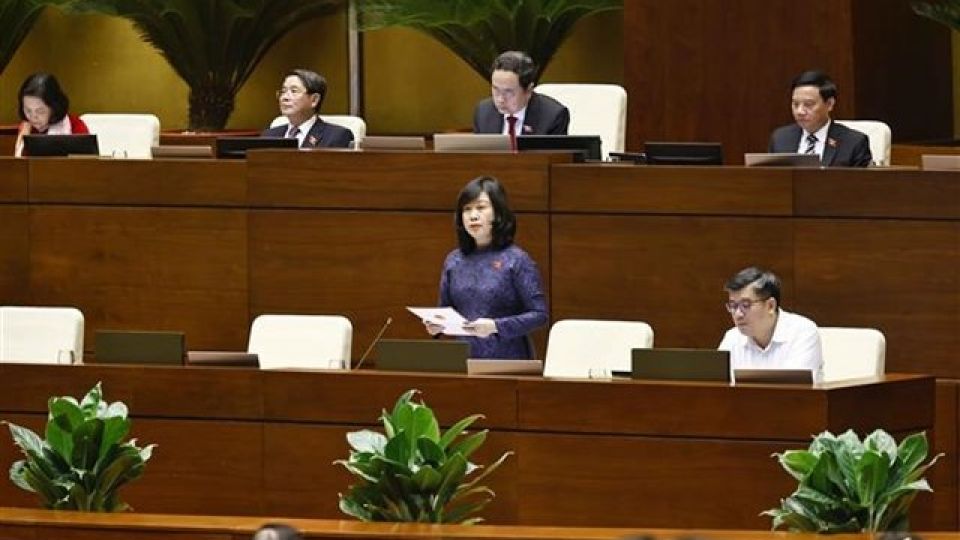November 12, 2024
HANOI – At the National Assembly (NA)’s question and answer session on Monday afternoon, legislators questioned Minister of Health Đào Hồng Lan about the ministry’s responsibility in reducing the harmful effects of e-cigarettes and heated tobacco products, especially in schools.
Deputy Phạm Thị Kiều from the Central Highland province of Đắk Nông voiced public concerns regarding the current use of e-cigarettes and heated tobacco among young people.
Minister Lan stated that the Law on Prevention and Control of Tobacco Harm is in the process of being revised (it was first implemented over ten years ago) and when it was first drafted, new products like e-cigarettes did not exist.
Based on an assessment of the current situation and consultations with the WHO and other relevant organisations, the MoH maintains its stance that the use of e-cigarettes and heated tobacco products is rapidly increasing and poses potential health and safety risks, especially for young people.
The MoH has conducted surveys on the use of these products among adults. The results show that the highest use of e-cigarettes and heated tobacco products are among those aged 15-24.
Notably, usage has risen among young people, especially teenage girls. The rate of e-cigarette use among students aged 13-15 increased from 3.5 per cent in 2022 to 8 per cent in 2023.
The MoH has submitted a report to the Government assessing the impact of these new tobacco products.
Bringing e-cigarette products resembling toys to the assembly hall as evidence, Minister Lan emphasised the difficulty of controlling them.
The MoH identified reasons why new tobacco products continue to circulate on the market without regulatory permission. However, due to the tobacco industry’s profit motives, these products remain available.
Lan said the MoH plans to introduce stricter measures to control e-cigarettes in the future. It has submitted a report to the NA proposing a ban on e-cigarettes and heated tobacco products before the revised Law on Prevention and Control of Tobacco Harm is reviewed and passed.
In a recent ‘Children’s Parliament’ session, all of the children there supported a ban on e-cigarettes and heated tobacco products. Minister Lan expressed hopes that this proposal would be considered in the session and that the NA would issue a decision to ban these products to protect public health.
Regarding new tobacco products, deputy Nguyễn Thị Mai Thoa from the northern province of Hải Dương raised questions about stop smoking programmes for children in local areas.
Minister Lan said that the Tobacco Harm Prevention Fund currently organises a network to get people to stop. The MoH has 24 units participating in this network, including hospitals under the ministry, with major specialised hospitals such as Bạch Mai Hospital, the National Lung Hospital and Huế Central Hospital, which serve large numbers of patients.
Bạch Mai Hospital, in particular, has established a stop smoking centre. The MoH has also set up a hotline offering counselling sessions and these efforts have been effectively implemented over recent years.
In response to the questions on the special consumption tax for new tobacco products, the minister urged legislators to consider the tax implications on tobacco. She pointed out that for every dollar gained in tobacco tax, five dollars are spent on addressing public health impacts, not to mention the long-term health effects on the future generation.
Therefore, she hopes the NA will support a ban on new forms of tobacco.
In response to deputy Khang Thị Mào from the northern province of Yên Bái, who raised concerns about doctors or healthcare workers endorsing drugs or dietary supplements, Minister Lan explained that laws governing advertising of medicines, supplements, pharmaceuticals and cosmetics clearly prohibit the use of doctors’ or healthcare facilities’ images for promotional purposes.
The Advertising Law, currently under revision, reinforce this restriction. The ministry has issued notices to health departments and facilities nationwide, reminding healthcare staff to refrain from unauthorised advertising.
Addressing deputies’ concerns over the management of medical licences, the minister noted that, under the revised Law on Medical Examination and Treatment and Decree 96, a healthcare practitioner is allowed only one licence.
The MoH is moving towards nationwide management of practitioners’ licences.
She added that the MoH’s practitioner management software system covers 430,000 out of more than 600,000 practitioners nationwide. However, since it was built as a closed system, upgrades are being made to align it with Decree 96 and the new Law on Medical Examination and Treatment (2023).
In response to a question from deputy Nguyễn Thị Tuyết Nga from central Quảng Bình Province regarding pharmaceutical management, Minister Lan said that there are currently 180 import facilities, over 5,000 wholesale facilities and 65,000 retail facilities across the country.
However, she noted that policies to attract investment in the pharmaceutical industry have been limited and there has been insufficient prioritisation to encourage enterprise development and investment in this sector.
Minister Lan stated that the MoH has submitted to the Prime Minister the strategy for the development of the pharmaceutical industry and the programme for the development of the medicinal herb industry.
With these two initiatives and upcoming preferential investment policies, she said this will create opportunities for the growth of the pharmaceutical sector.


